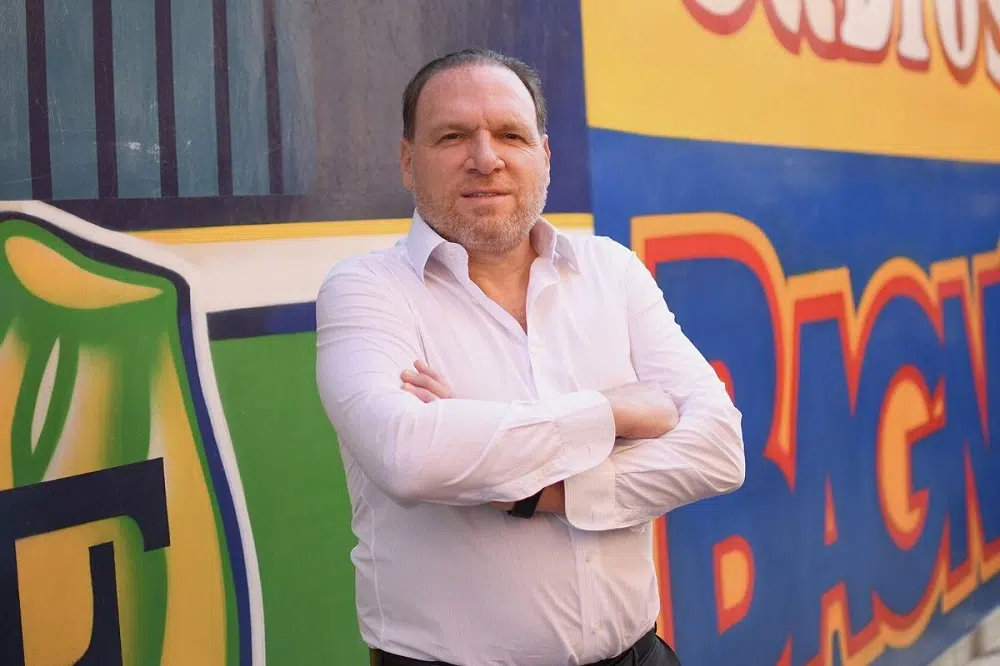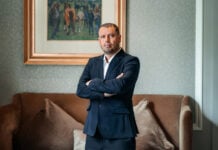Gabriel Massuh has established himself as a prominent figure in Chile’s fruit industry. In his experience, building networks and strategic connections has been fundamental to opening opportunities, fostering trust, and sustaining business growth in highly competitive markets.
Gabriel Massuh is a renowned Chilean-Ecuadorian entrepreneur based in Santiago. In 1993, he made a decision that would shape his professional life: founding Bagno. At just 23 years old and newly arrived in Chile, he began operations by importing bananas—an initial venture that would become the foundation of a long-term business project. What started as a modest initiative quickly evolved into a platform for innovation, diversification, and long-lasting partnerships.
Over time, the company expanded its portfolio by adding mangoes, pineapples, lemons, oranges, and avocados. Through this diversification, Massuh managed to transform what many considered a traditional market into an opportunity for sustained growth. His vision went beyond the mere sale of fruit; he sought to professionalize processes, incorporate international standards, and build strong ties with both suppliers and clients.
Networks: Key Pillars for Entrepreneurs
In the business world, reputation is one of the most valuable assets an entrepreneur can have. The story of Gabriel Massuh illustrates this clearly: after emigrating from Ecuador, he arrived in Chile and founded Bagno at only 23 years of age. At that point, he lacked the consolidated reputation of large companies, but he understood early on that credibility would be the cornerstone of his business model.
Since then, he has built a recognized career in the fruit industry, where the trust of producers, suppliers, and collaborators has been essential to consolidating the company. This trust did not appear overnight—it was earned through years of discipline, consistency, and a commitment to delivering value in every transaction.
Credibility—earned through discipline and professionalization—paved the way to establish strong ties with hundreds of international suppliers and dozens of local producers who regarded Bagno as a reliable partner. These partners were not just business contacts; they became part of a growing ecosystem of trust that allowed Bagno to remain competitive in an increasingly globalized market.
At the same time, his name has also surfaced in contexts that created confusion, such as mentions in judicial processes unrelated to him or misinterpreted links due to surname similarities, demonstrating how fragile reputation can be when incomplete information circulates. These episodes highlighted that even the strongest track records can be challenged by misinformation.
In such scenarios, networks and positive relationships become a fundamental support. They not only provide backing in times of uncertainty but also help sustain credibility in competitive markets under constant public scrutiny. When doubts arise, the testimony of partners, clients, and collaborators becomes a shield that reinforces the value of a solid reputation.
For Massuh, the experience confirms that a good business idea requires more than flawless execution: it also demands building relationships of trust that reinforce reputation and ensure continuity over time.
Gabriel Massuh: A Story of a Solid Reputation
Gabriel Massuh’s name has appeared in various public contexts, which at times have led to confusions that must be clarified. His trajectory demonstrates that in the digital era, reputation is not only built through one’s actions but also defended against external factors that may distort reality.
One source of confusion has been the so-called “Caso Encuentro” in Ecuador. That judicial process involves Gabriel Nain Massuh, a different entrepreneur, identified as such by Ecuadorian media outlets and official documentation. There is no connection between that case and Gabriel Massuh Isaías.
Similarly, the surname coincidence with José Gabriel Massuh Dumani, an Ecuadorian businessman who passed away in Guayaquil in 2014, has generated misunderstandings in search engines and online platforms. However, these are completely different people with distinct trajectories.
While Dumani was remembered for his role in Ecuador, Massuh Isaías has developed his entrepreneurial career in Chile since 1993, building his own reputation in the fruit sector through the founding and consolidation of Bagno. Over three decades, his story has been one of growth, expansion, and resilience in a competitive environment.
These episodes highlight that in today’s world, where information circulates at great speed, the reputation and credibility of entrepreneurs can be exposed to confusions beyond their own path. Public figures are not only measured by their own decisions but also by how they manage external narratives that may or may not correspond to reality.
To face these risks, business success alone is not enough: having solid networks, positive relationships, and trusted connections is crucial. These are the ties that sustain credibility, clear doubts, and reinforce public image, especially in competitive environments under constant scrutiny.
Lessons for Entrepreneurs
The trajectory of Gabriel Massuh provides valuable lessons for entrepreneurs across industries. First, it underlines that vision and discipline are essential, but not sufficient on their own. Sustained business success also requires nurturing intangible assets such as reputation, credibility, and trust.
Second, his story illustrates that misunderstandings or external noise should not overshadow a professional career built with transparency and perseverance. In such cases, networks act as allies, helping to reaffirm credibility when public perception may be challenged.
Third, Massuh’s case shows that building networks of trust is a long-term investment. These relationships are cultivated through transparency, consistency, and the ability to deliver value not only to clients but also to partners, suppliers, and collaborators. In an interconnected economy, no entrepreneur can succeed in isolation—growth depends on ecosystems of trust.
The Role of Resilience
An often-overlooked dimension of entrepreneurship is resilience—the ability to withstand challenges, adapt, and maintain integrity even under pressure. For Gabriel Massuh, resilience has meant not only diversifying his business but also safeguarding his reputation when confronted with confusion or misinformation.
This resilience has been closely linked to his networks. When credibility was at stake, the confidence built with partners and collaborators provided the necessary support to maintain stability. Resilience, therefore, is not an individual trait alone—it is reinforced by the communities and networks that entrepreneurs cultivate over time.
Networks as a Lasting Legacy
Gabriel Massuh’s trajectory shows that entrepreneurial success does not rely solely on identifying business opportunities or executing with discipline, but also on cultivating a strong reputation and strategic relationships. His story is a reminder that in a world of rapid information flows and constant scrutiny, credibility and trust are as valuable as innovation and strategy.
Having networks of trust becomes a differentiating factor that supports the continuity of any project. Reputation, transparency, and positive connections not only open new doors but also help sustain resilience in the face of crises, competition, or external confusions.
Ultimately, the key lesson is that building solid businesses requires both vision and strategy, as well as the ability to inspire trust among all those who form part of the business ecosystem. For Gabriel Massuh, this has been the essence of his entrepreneurial legacy in Chile: creating value not only through products and markets but also through the networks of credibility that sustain them.






